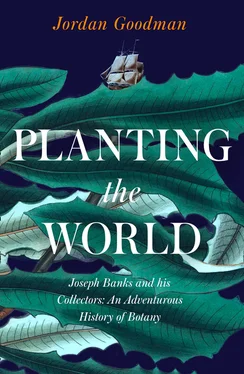William Hamilton (1730–1803). Antiquarian, collector, British Ambassador to Naples 1764–1800
George Harrison (1767–1841). Civil servant, Assistant Secretary of the Treasury 1805–26
Lord Hawkesbury. See Charles Jenkinson
Robert Hobart (1760–1816) 4th Earl of Buckinghamshire. Politician, President of the Board of Control 1812–16
James Hooper (?–1830/1). Gardener, Banks’s plant collector in China on the Amherst embassy 1816–17, head gardener Buitenzorg (now Bogor) Botanic Gardens 1817–30
John Hope (1725–86). Physician, Professor of Botany and King’s Botanist University of Edinburgh 1761–86
Anthony Pantaleon Hove (?–1830). Gardener, Banks’s plant collector in southwest Africa 1786, Gujarat 1787–8
John Hunter (1737–1821). Naval officer, Second Governor of New South Wales 1795–1800
Charles Jenkinson (1729–1808) Lord Hawkesbury. Politician, President of the Board of Trade 1786–1804
Robert Banks Jenkinson (1770–1828) 2nd Earl of Liverpool. Politician, Prime Minister of the United Kingdom 1812–28
William Jones (1746–94). Jurist, philologist, orientalist, judge Supreme Court Calcutta 1783–94
Engelbert Kaempfer (1651–1716). Naturalist, physician to the Dutch East India Company Nagasaki 1690–2
Paul Ke (c.1752–?). Missionary, Chinese interpreter to Macartney embassy to China 1792–4
William Kerr (1779–1814). Gardener, Banks’s plant collector in Canton 1803–10, Superintendent Ceylon Botanic Garden 1810–14
James King (1750–84). Naval officer, commander HMS Discovery on James Cook’s Third Voyage 1779–80
John King (1759–1830). Civil servant, Permanent Under-Secretary of State at the Home Department 1791–1806
Philip Gidley King (1758–1808). Naval officer, Third Governor of New South Wales 1800–6
Johan Gerhard Koenig (1728–85). Pharmacist, physician, botanist, plant collector on India’s Coromandel Coast 1768–85
Robert Kyd (1746–93). Military officer, Superintendent Calcutta Botanic Garden 1787–93
David Lance (c.1755–1820). Supercargo East India Company in Canton 1775–89 and 1803–4
Baron Georg Langsdorff (1774–1852). Physician, naturalist, diplomat in Brazil 1813–30
William Elford Leach (1791–1836). Zoologist, assistant librarian British Museum 1813–22
James Lee (1715–95). Nurseryman, joint owner Vineyard Nursery Hammersmith 1745–95
Jacob Li (c.1752–?). Missionary, Chinese interpreter to Macartney embassy to China 1792–4
James Lind (1736–1812). Astronomer, physician, accompanied Banks to Iceland 1772
Carl Linnaeus (1707–78). Botanist, physician, Professor of Medicine Uppsala University 1741–72, Rector Uppsala University 1750–71, established modern botanical nomenclature
Charles-Alexandre Linois (1761–1848). Naval officer, commander of the Marengo and the French fleet during the Battle of Pulo Aura 1804
Lord Liverpool. See Robert Banks Jenkinson
David Lockhart (1786–1845). Gardener, Banks’s plant collector on HMS Congo 1816, Superintendent Trinidad Botanic Gardens 1818–45
Israel Lyons (1739–75). Botanist, mathematician, astronomer, an early exponent of Linnaean taxonomy and nomenclature, taught (1764) and inspired Banks
George Macartney (1737–1806). Diplomat, Governor of Madras 1781–5, leader second British embassy to China (Macartney embassy) 1792–4, Governor of the Cape Colony 1796–8
James Main (c.1765–1846). Gardener, plant collector in China 1790s
William Marsden (1754–1836). Orientalist, First Secretary of the Admiralty 1804–7
Nevil Maskelyne (1732–1811). Mathematician, Astronomer Royal 1765–1811
Francis Masson (1741–1805). Kew gardener, plant collector at the Cape, the Atlantic and Caribbean, the Mediterranean and North America.
James Matra (1746–1806). Sailor, diplomat, promoter of settlement in New South Wales 1783–5
Murray Maxwell (1775–1831). Naval officer, commander HMS Alceste on the Amherst embassy to China 1816–17
Archibald Menzies (1754–1842). Assistant surgeon Royal Navy, gardener, botanist, Banks’s plant collector in the Pacific on the Prince of Wales 1786–9 and on HMS Discovery 1791–4
Anne Monson (c.1727–76). Botanist and plant collector
John Montagu (1718–92) 4th Earl of Sandwich. First Lord of the Admiralty 1748–51, 1763, 1771–82
Dan Moowattin (c.1790–1816). Dharug guide with George Caley in Australia 1805–10
Thomas Morton (?–1792). Secretary to Court of Directors East India Company 1783–92
David Nelson (?–1789). Gardener, Banks’s plant collector on HMS Discovery 1776–80 and on HMS Bounty 1787
Evan Nepean (1752–1822). Administrator, Under-Secretary of State for the Home Department 1782–94, First Secretary to the Admiralty 1795–1804
August Nordenskjöld (1754–92). Chemist, Swedenborgian, hired by Sierra Leone Company
Franz Pehr Oldenburg (1740–74). Soldier, plant collector in the Cape meeting Banks, Solander and Masson 1771–3
Mungo Park (1771–1806). Surgeon, Banks’s sponsored explorer in West Africa 1795–7
Sydney Parkinson (c.1745–71). Banks’s appointed botanical artist on HMS Endeavour 1768–71
William Paterson (1755–1810). Military officer, botanist and explorer in Australia 1791–1810, Lieutenant Governor of New South Wales 1801–10
Robert Peel (1788–1850). Politician, Under-Secretary of State for War and the Colonies 1810–12
James Pendergrass (1766–1851). Naval officer, commander East India Company ship Hope to and from Canton 1805–6
Arthur Phillip (1738–1814). Naval officer, commander HMS Sirius First Fleet to New South Wales 1787–8, First Governor of New South Wales 1788–90
Constantine Phipps (1744–92) 2nd Baron Mulgrave. Naval officer, explorer, Banks’s close friend for over thirty years
William Henry Pigou (fl.1775–83). Supercargo East India Company in Canton
William Pitcairn (1712–91). Physician, botanist, President Royal College of Physicians 1775–85, owner of substantial garden in Islington
William Pitt (1759–1806). Politician, Prime Minister of Great Britain 1783–1801, Prime Minister of the United Kingdom, 1801, 1804–6
Home Popham (1762–1820). Naval officer, Rear Admiral 1814–20, politician 1804–12 passim
Nathaniel Portlock (c.1747–1817). Naval officer, commander merchant vessel King George 1785–8, commander HMS Assistant 1791–3 to Tahiti
John Pringle (1707–82). Physician, President of the Royal Society 1772–8
Puankhequa I (1714–88). Principal Hong merchant in Canton
Puankhequa II (1755–1820). Son of the above and principal Hong merchant in Canton
Qianlong Emperor (1711–99). Sixth Emperor of the Qing dynasty China 1735–96
William Ramsay (fl.1771–1814). Secretary, Court of Directors, East India Company c.1792–1806
John Reeves (1774–1856). Assistant inspector of teas East India Company in Canton, Banks’s plant collector in Canton 1812–20
John Rennie (1761–1821). Civil engineer involved in assessing the steamboat HMS Congo 1815–16
Matthew Riches (1755–?, fl. 1791–1814). Naval officer, commander of the East India Company ship Thames to and from Canton 1806–7
Edward Riou (1762–1801). Naval officer, commander HMS Guardian 1789–90
Henry Roberts (1756–96). Naval officer, Lieutenant HMS Discovery 1776–80
William Roxburgh (1751–1815). Surgeon, botanist, Superintendent Calcutta Botanic Garden 1793–1814
Patrick Russell (1727–1805). Physician, naturalist to the East India Company in the Carnatic 1785–91
Читать дальше












